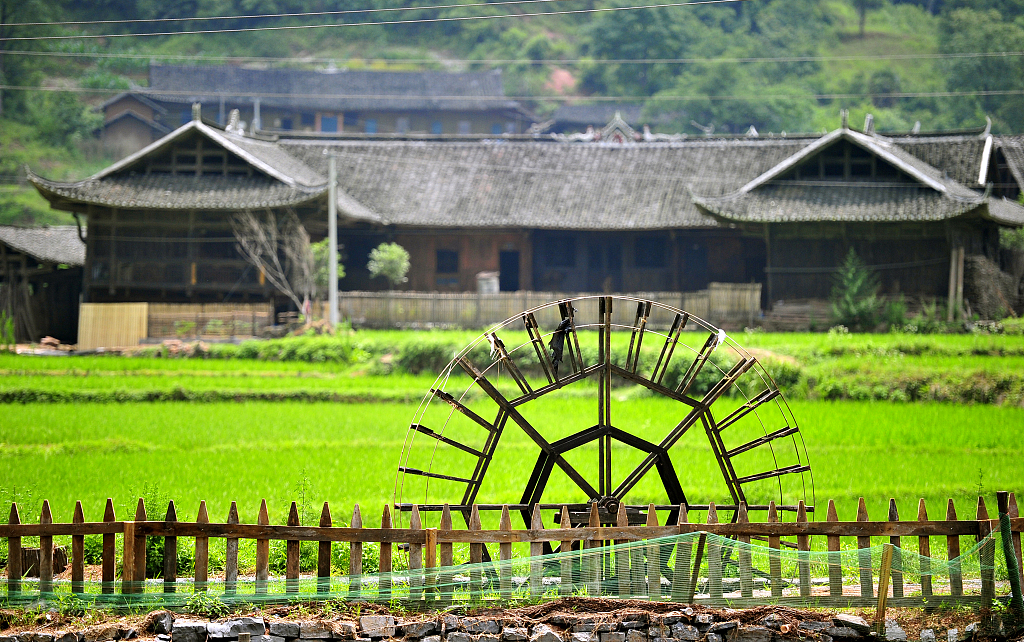
Lesser Fullness, also known as “Xiaoman” in Chinese, is the eighth solar term of a year. It marks the second solar term of summer. Explanations for Lesser Fullness in southern and northern China are different. In northern China, people believe that during this period, seeds from the grain are becoming full but not yet ripe. While it’s getting steadily hotter and wetter, the wheat and rice grains become fuller. However, in southern China, Lesser Fullness reflects the climatic characteristics of heavy rainfall. As a saying mentions, “A heavy rainfall makes the river full,” the weather during this period will become quite humid with frequent rainfalls.
Timely rain brings hope of a good harvest. Therefore, in some rural areas, people will offer to the deity (神) of the waterwheel as their agricultural irrigation greatly depends on waterwheels for many centuries in China. According to legends, the deity of the waterwheel is a white loong. In the ceremony, people would place fish, meat, and scented candles in front of the waterwheel. The most special ritual is that villagers would spill a bottle of water on farmlands, wishing for sufficient water that a good harvest needs.
In southern China, people celebrate the birthday of the Goddess of Silk on Lesser Fullness. Legends have it that she was the first person to raise silkworms, weave silk and teach people how to manufacture it. During this solar term, the silkworms have cocooned themselves in silver threads of silk, and the cocoons (茧) are harvested for spinning silk reels. To pray for an abundant silk output, ancient Chinese held ceremonies to worship the goddess.
During this term, as temperatures rise, people are encouraged to keep healthy by eating more vitamins. Chinese people collected sowthistle (苦菜) from the wild and cooked it in different ways such as boiling, steaming and making salads. According to Traditional Chinese Medicine, vegetables that taste bitter help calm the body in increasingly hot weather. Besides, it is a good time to eat fat fish and shrimps as the rising water level results in abundant freshwater food across China.
1.After Lesser Fullness, _________.
A spring goes to summer
B the grain quickly becomes ripe
C the weather heats up quickly
D rain increases gradually
解析:选D。D细节理解题。根据第一段中的“While it’s getting steadily hotter and wetter”并结合“A heavy rainfall”“frequent rainfalls”可知,小满节气后,天气渐渐由暖变热,并且降水也会逐渐增多。故选D。
2.What’s the author’s purpose in mentioning the deity of the waterwheel?
A To explain celebration activities during Lesser Fullness.
B To introduce the deity of the waterwheel.
C To show the history of Lesser Fullness.
D To talk about a special festival.
解析:选A。A推理判断题。根据“the deity of the waterwheel”定位到第二段,结合“Therefore, in some rural areas, people will offer to the deity (神) of the waterwheel”和“...wishing for sufficient water that a good harvest needs”可知,第二段主要讲的是在中国的一些农村地区,小满的时候会祭祀水车车神,以祈求风调雨顺致丰收,祭祀车神属于小满的传统活动。故选A。
3.What does the underlined word “worship” probably mean?
A Express gratitude to.
B Show respect to.
C Offer regret to.
D Give criticism to.
解析:选B。B词义猜测题。根据第三段划线部分前文的“To pray for an abundant silk output”可知,为了祈求丝绸产量丰富,古代人们会举行“敬奉”丝绸女神的仪式。故选B。
4.What does the author advise readers to do during Lesser Fullness?
A To build their body.
B To eat seasonal food.
C To take a cold bath.
D To take a sunbath.
解析:选B。B细节理解题。根据最后一段中的“collected sowthistle (苦菜) from the wild”“it is a good time to eat fat fish and shrimps as the rising water level results in abundant freshwater food”可知,小满适合吃应季的苦菜和鱼虾等。故选B。